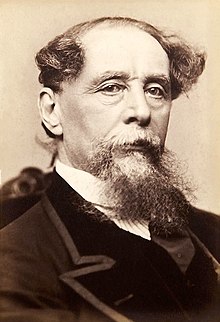Novelist Charles Dickens died on June 9, 1870 at his home at Gad’s Hill Place in Kent, England. He
created some of the world's most memorable fictional characters and is
generally regarded as the greatest novelist of the Victorian era. During his
life, his works enjoyed unprecedented fame, and by the twentieth century his
literary genius was broadly acknowledged by critics and scholars. His novels
and short stories continue to be widely popular.
He was born on
February 7, 1812 in Portsmouth, England. At a young age, Dickens left school to
work in a factory after his father was thrown into debtors' prison. Although he
had little formal education, his early impoverishment drove him to succeed.
Over his career he edited a weekly journal for 20 years, wrote 15 novels, 5
novellas and hundreds of short stories and non-fiction articles, lectured and
performed extensively, was an indefatigable letter writer, and campaigned
vigorously for children's rights, education, and other social reforms.
Dickens sprang
to fame with the 1836 serial publication of The
Pickwick Papers. Within a few years he had become an international literary
celebrity, famous for his humor, satire, and keen observation of character and
society. His novels, most published in monthly or weekly installments,
pioneered the serial publication of narrative fiction, which became the
dominant Victorian mode for novel publication. The installment format allowed
Dickens to evaluate his audience's reaction, and he often modified his plot and
character development based on such feedback. Dickens was regarded as the
literary colossus of his age and his 1843 novella, A Christmas Carol, is one of the most influential works ever
written, and it remains popular and continues to inspire adaptations in every
artistic genre. On June 8, 1870, Dickens suffered a stroke at his home after a
full day's work on Edwin Drood. He never regained consciousness, and the
next day, on June 9th, he died at Gad's Hill Place. Contrary to his
wish to be buried at Rochester Cathedral "in an inexpensive,
un-ostentatious, and strictly private manner," he was laid to rest in Poets'
Corner at Westminster Abbey.
Michael Thomas Barry is the author of Literary Legends of the British
Isles. The book can be purchased from Amazon through the following
links:



No comments:
Post a Comment